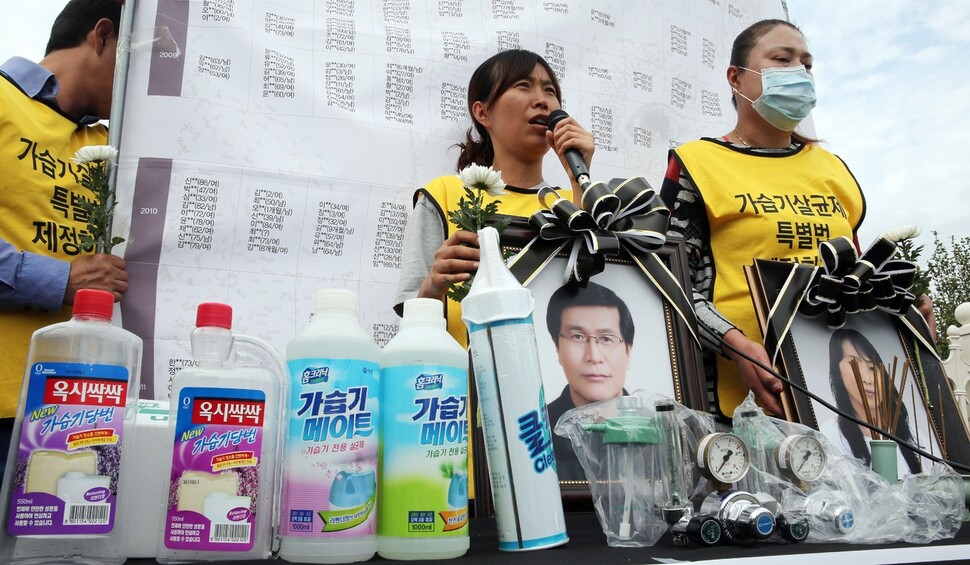hankyoreh
Links to other country sites 다른 나라 사이트 링크
[Editorial] Government should refuse US demands to ease regulations on harmful chemicals

The US is apparently pressing the South Korean government to relax regulations on chloromethylisothiazolinone (CMIT) and methylisothiazolinone (MIT) compounds used in humidifier disinfectant. Combined with the concurrent pressure to revise the KORUS FTA, the concern is that this is part of an all-out trade-related offensive from Washington. It’s hard to fathom this kind of action from the US, which cannot be unaware that many South Koreans were injured and killed as a result of using humidifier disinfectant. This is a moment that calls for impartial action from Seoul.
As part of its response measures to the disinfectant tragedy, the government has banned the use of those ingredients in all sprays and air fresheners. Given the serious nature of what happened, this makes complete sense. Yet the US continues raising objections and has taken the issue to the World Trade Organization (WTO). It’s also reportedly demanding the allowance of “preservative uses” and scientific data to demonstrate harmfulness.
Even in the US, these substances are classified as industrial pesticides and designated as a Class II inhalation hazards. In their case, it is up to the industries to manage them independently. If the US government is adopting an approach of “Why regulate these things when we allow them?” it is the wrong one. Around 1,000 South Koreans died after using humidifier disinfectant, while another 4,000 or so were sickened. The President acknowledged the government’s fault, and even apologized to victims and their family members. It is illogical under the circumstances to apply the same standard used in the US, and the South Korean public would never accept it.
It’s also not practical to demand scientific evidence of the compounds’ harmfulness ahead of any regulations. Toxicity studies on the substances are already under way in South Korea. It’s a situation where we would be hard-pressed to come up with any immediate concrete data on how hazardous a given substance is. Yet the failure to provide scientific evidence of harmfulness is no guarantee of safety. When people are dying, it makes no sense to say we shouldn’t regulate something because there is no data to prove its harmfulness.
It’s possible the US may try to use this issue to meddle with chemical regulations in general. Indeed, it is also taking issue with various other chemical regulations currently undergoing National Assembly legislative procedures. Fortunately for now, the government is insisting that these are “unavoidable minimal measures to protect the public’s health.” It should also be stressed that it is the WTO norm to allow trade regulations to protect safety and public health. As a matter that affects the public’s lives, this calls for assertive and responsible action.
Please direct questions or comments to [english@hani.co.kr]

Editorial・opinion
![[Column] How tragedy pervades weak links in Korean labor [Column] How tragedy pervades weak links in Korean labor](https://flexible.img.hani.co.kr/flexible/normal/500/300/imgdb/original/2024/0703/8717199957128458.jpg) [Column] How tragedy pervades weak links in Korean labor
[Column] How tragedy pervades weak links in Korean labor![[Column] How opposing war became a far-right policy [Column] How opposing war became a far-right policy](https://flexible.img.hani.co.kr/flexible/normal/500/300/imgdb/original/2024/0702/5017199091002075.jpg) [Column] How opposing war became a far-right policy
[Column] How opposing war became a far-right policy- [Editorial] Korea needs to adjust diplomatic course in preparation for a Trump comeback
- [Editorial] Silence won’t save Yoon
- [Column] The miscalculations that started the Korean War mustn’t be repeated
- [Correspondent’s column] China-Europe relations tested once more by EV war
- [Correspondent’s column] Who really created the new ‘axis of evil’?
- [Editorial] Exploiting foreign domestic workers won’t solve Korea’s birth rate problem
- [Column] Kim and Putin’s new world order
- [Editorial] Workplace hazards can be prevented — why weren’t they this time?
Most viewed articles
- 110 days of torture: Korean mental patient’s restraints only removed after death
- 2In the blink of an eye, an unthinkable crash turned a night out into a nightmare
- 3Families, friends mourn loved ones cut down in prime in deadly car crash
- 4Experts cast doubt on driver’s claim that sudden unintended acceleration caused deadly crash
- 5[Column] How tragedy pervades weak links in Korean labor
- 6Japan is building a military meant for more than self-defense — and has the US to thank for it
- 7KCC chief resigns to avoid impeachment, the second in 7 months
- 8Democrats seek to impeach 4 prosecutors, including those tied to probes into Lee Jae-myung
- 91 in 10 marriages in Korea last year was with a foreign national
- 10[Column] How opposing war became a far-right policy